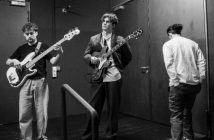I recently had the opportunity to see Ezra Furman performing in Brixton, following the release of his new album Transangelic Exodus. The album is a tour de force of passion, borrowing from 60s pop, noir thrillers and the music of Lou Reed. It is in stark contrast to his albums in the past, as Furman acknowledged himself, made when “we [the Visions, née the Boyfriends]were more likeable”. It is darker, as even the cover suggests, but arguably his most truthful album yet, despite revolving around a fictional narrative.
Furman’s obsession with Lou Reed is reflected in his artistic endeavours: this year he released a book about the troubled musician’s life. He links himself to Reed, writing “queerness is defined by continual transformation”. In other words, the idea of a chameleon ability to progress through identity, simultaneously fighting and coming to grips with it. Transangelic Exodus embodies this, Furman’s career touched upon thematically. For instance, he discusses the importance of truth on the record: that being uncomfortable with your identity transforms you into a liar (as he sings in ‘Compulsive Liar’ “I’ll always be conniving/I’ll always be negotiating with the truth”).
The theme is encapsulated in its title: Transangelic Exodus explores a world where people become angels “because they grow wings. They have an operation, and they’re transformed. And it causes panic because some people think it’s contagious, or it should just be outlawed”. Furman pinpoints a social paranoia because although he has grown and discovered other parts of his character, he still fears those who have alternative mindsets and struggle to accept this transformation.
The album’s narrative begins with ‘Suck the Blood from my Wound’, a song about supernatural misfits in a red Camaro: “Angel don’t fight it/ To them you know we’ll always be freaks”. Furman talks of running from “straight authorities”, in a narrative so vividly described you watch it unfold as a film in your mind. ‘Driving Down to L.A.’ is an electric xylophone lullaby interrupted by a crashing synth and Furman’s wailing; a crescendo met best with a sudden flash of light around the venue from the lighting technician (Brixton did not supply this). ‘I Love You So Bad’ incorporates the doo-wap backing vocals known from his previous albums; about the sadness of a lost love, the misery of youth, disguised as a love song.
‘Maraschino Red Dress $8.99’ resonates with me and many others I know: describing the fear of buying women’s clothes or exploring gender and being judged for doing so. Yet it is now a huge part of his identity: most reviews I’ve read listing him as ‘cross-dressing’. Honestly, you cannot discuss Furman without an analysis of his look; it goes without saying that there is a visual medium which has followed him throughout his career. He somewhat borrows from Tim Curry as Frank n’ Furter and Lou Reed’s eyes dark like the cover of Transformer, yet in a slutty white Hillary Clinton pantsuit adorned with pearls. He wears blood red lipstick and blue eyeshadow which glints in the light.
Again, we notice these contrasts in his look which demonstrate his transformation: he embodies multiple, opposing characters all linked through the same pain; the destructive rock-star on the verge of a breakdown versus his controlled humility, the idea of combining typically masculine versus feminine qualities, the religious versus punk identity struggle. He mutates throughout the show, and we understand that his fear of social unacceptance still stands, no matter how visually open you are to the world.
Transangelic Exodus is more of a road movie than a collection of songs, strung together with weird, haunting sound mixes harmonising as a cinematic experience. Creating a similar effect, his depressing commentary between songs ensures no eyes leave him onstage: “Do you like life?” he drawls staring at us under his blue painted eyelids, which receives a chuckle from a British audience accustomed to dark humour. “Like… do you ever get bored of life? Sometimes?” He is stark and honest and forces an “oh fuck” moment of self-confrontation, standing in your going-out clothes holding a £6 lager.
However, there is a more profound side to this. Throughout we are reminded of his struggle with himself. Although this is theatre, it is reality; his character seems to be a truth from his past which he simultaneously mocks and utilises. I am reminded of a line in ‘Watch You Go By’ “I’ve got a bright future in music/ as long as I never find true happiness” the words of an artist, much in the vein of Lou Reed, who uses his darkness to create, and without it he feels he is nothing. It is integral to his presence. His performance of ‘No Place’ illustrates this: he spits his lines, one hand twitching spasmodically by his side. During the thumping instrumental he marches back and forth across the stage, bent forward, his arms extended behind him like an angry child.
The atmosphere is mixed: two and a half minutes of screaming melodrama, ended by a sweet, whispered “thanks” with the bat of his eyelashes, breathing heavily from the exertion, spit sparkling on his upper lip. He is genuinely humble, despite the shit turnout at the fault of bad advertising and a date change. It is one of those moments when you’re able to look through the artist’s eyes and understand that they are genuinely grateful, that this fleeting experience is meaningful to them in some way.
For me, this concert is the start of a long obsession with Furman as an artist, due to the depth of his music and what he stands for. I go home, I listen to his album differently after the encounter, I order his book on the train home, I watch his interviews. But I think what’s most important is that today the LGBT society deserves a spotlight, and his conversation about queerness and identity will always be interesting and relevant. As he describes Reed, he himself is a “queer icon”, because, perhaps, despite the darkness and the lies and the constant transformation, in his music, he’s found something true.



